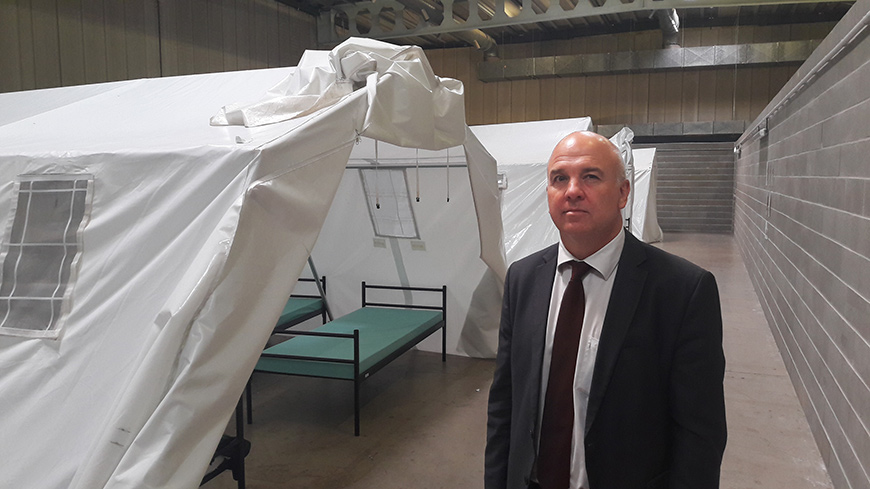“Luxembourg has made considerable efforts to respond to Europe’s refugee and migrant crisis by receiving asylum-seekers and relocating and resettling refugees from other parts of Europe and beyond. It has largely avoided the trap of political instrumentalisation of the issue of migration, and government and civil society have been actively providing protection to people in need”, said Nils Muižnieks, the Council of Europe Commissioner for Human Rights, concluding a visit to Luxembourg from 18 to 22 September 2017 which focused on the issues of asylum, migration and integration. “Nevertheless, more could be done to address delays in examining asylum claims and in ensuring access to housing, employment and inclusive education”.
The Commissioner notes that the authorities are addressing the existing delays in processing asylum claims, including by increasing the number of staff assigned to handle the backlog. However, applicants must be provided more systematically with information on the progress made in the examination of their claims in order to prevent uncertainty and increase their confidence in the process.
Additional efforts should also be made in the identification of vulnerable persons among all new arrivals, in particular those who have experienced torture, sexual abuse or human trafficking. To this end, the Commissioner encouraged the authorities to recruit more social assistants and continue to provide staff with dedicated training. “Children are inherently vulnerable, and all unaccompanied minors should be appointed a trained ad hoc administrator and a legal guardian, in order to assist them through the asylum process and to enable the disclosure of possible exploitation and abuse”, the Commissioner said. “The presumption of minority should be applied in cases of doubt as to a child’s age.”
Commissioner Muižnieks visited three sites in or near the city of Luxembourg: the reception centre for asylum-seekers “Lily Unden” operated by the Luxembourgish Red Cross, the Centre de rétention (Detention Centre) in Findel and the Structure d’Hébergement d’Urgence (SHUK) (Structure for Emergency Accommodation) managed by the Luxembourg Reception and Integration Agency. “The planned review of the activity of the Centre de rétention and in particular of the situation regarding detention of families with children, which is to be presented to the Chamber of Deputies before end of this year, should be made available to the wider public,” said the Commissioner. “As for asylum-seekers whose claims have been rejected, the authorities should make more use of alternatives to detention in order to avoid cases of repeated deprivation of liberty.”
“The authorities are facing a challenge when it comes to providing all asylum-seekers with suitable accommodation in the context of a general housing shortage,” said the Commissioner. “There should be a longer-term reflection with regard to access to housing for beneficiaries of international protection and, in so far as feasible, authorities should try to house them in locations likely to enable integration while avoiding geographical isolation.
While the government has taken steps to facilitate access to employment for asylum-seekers, like the shortening of the mandatory waiting period for such a possibility, the number of asylum-seekers who actually find work is very low. “Solutions must be found to enable asylum-seekers and beneficiaries of international protection to integrate Luxembourg’s labour force as early as possible,” said the Commissioner, while inviting the authorities to consider joining the Council of Europe’s pilot project on the “European Qualifications Passport for Refugees”, which aims at facilitating refugee integration and progression towards employment.
Luxembourg has the commendable policy of including all foreign children in the education system at a very early stage and without regard to their immigration status. Earliest possible access to schooling, especially in the context of a multilingual education system, is essential for these children’s and their families’ successful integration in the society. However, the Commissioner encourages the authorities to systematically collect and make publically available data on children remaining in special education, such as their number and duration of stay, and to integrate them in the regular education system as soon as possible. The government should also remain vigilant in ensuring that no isolation of foreign children takes place, and promote systematically their meaningful interaction with local pupils.
By reducing the length of residency required for acquiring nationality, recent legislative amendments will further facilitate the integration of many people in Luxembourg. With regard to beneficiaries of international protection, a ‘Parcours d’Intégration Accompagné’ integration programme, inaugurated this week, offers another pathway towards better integration by helping them learn Luxembourg’s languages and understand the workings of daily life.
“Raising awareness on human rights and combating discrimination are essential for making integration work,” said the Commissioner. He encouraged the authorities to implement equality policies to facilitate migrant integration and to rethink the role, the functions and the powers of the Centre for the Equality of Treatment, in particular by enabling it to take part in legal proceedings, increasing its resources, and introducing the legal obligation for those it queries to provide a reply. The forthcoming inauguration of a House of Human Rights should offer an opportunity to create more synergies among Luxembourg’s human rights institutions and give additional exposure to their work.
Regarding the ratification of international human rights instruments, the Commissioner was pleased to learn that the ratification of the Council of Europe Istanbul Convention is underway, and trusts that the process will be concluded promptly. He also recommends that the authorities consider the possibility of ratifying the Revised European Social Charter, as well as the International Labour Organisation’s 2011 Domestic Workers Convention.



